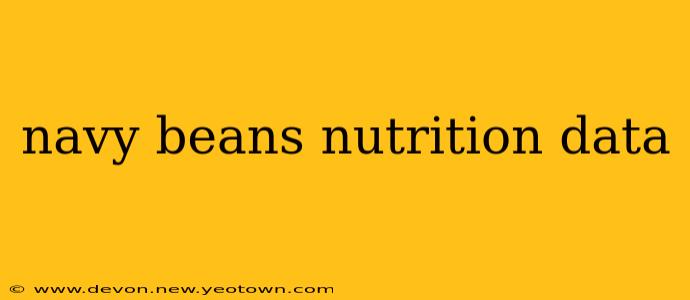The humble navy bean, often overlooked in the colorful world of legumes, is a nutritional superstar quietly working its magic. These small, white beans have been a staple in kitchens worldwide for centuries, and for good reason. Their mild flavor makes them incredibly versatile, lending themselves to soups, stews, salads, and even dips. But beyond their culinary versatility lies a wealth of nutritional benefits that are worth exploring. Let's dive into the fascinating world of navy beans and uncover why they deserve a prominent place in your diet.
What are the nutritional benefits of navy beans?
Navy beans are a nutritional powerhouse, boasting a remarkable profile of essential nutrients. They're an excellent source of protein, fiber, and various vitamins and minerals. A single cup of cooked navy beans provides a significant portion of your daily recommended intake of several key nutrients, contributing to overall health and well-being.
Specifically, navy beans are rich in:
- Fiber: This is a crucial component for digestive health, helping to regulate bowel movements and prevent constipation. The high fiber content also contributes to feelings of fullness, aiding in weight management.
- Protein: An excellent source of plant-based protein, navy beans are a valuable addition to vegetarian and vegan diets, providing the building blocks for muscles and tissues.
- Iron: Essential for carrying oxygen throughout the body, iron is often deficient in many diets. Navy beans offer a good source of this vital mineral.
- Potassium: This electrolyte helps regulate blood pressure and maintain fluid balance in the body.
- Magnesium: Plays a critical role in numerous bodily functions, including muscle and nerve function, blood sugar control, and blood pressure regulation.
- Manganese: A trace mineral essential for bone health, wound healing, and metabolism.
- Folate: Crucial for cell growth and development, particularly important during pregnancy.
- Zinc: Supports immune function, wound healing, and cell growth.
How many calories are in navy beans?
A one-cup serving of cooked navy beans typically contains around 215-220 calories. This makes them a relatively low-calorie food, especially considering the abundance of nutrients they provide. Their high fiber content also contributes to satiety, meaning you're likely to feel fuller for longer after consuming them, potentially aiding in weight management.
Are navy beans good for weight loss?
Yes, navy beans can be a valuable asset in a weight loss journey. Their high fiber content promotes feelings of fullness, reducing overall calorie intake. The protein in navy beans also helps to stabilize blood sugar levels, preventing energy crashes and cravings that often lead to overeating. Incorporating navy beans into a balanced diet can be a supportive strategy for sustainable weight management.
What are the health benefits of eating navy beans?
Beyond their nutritional profile, navy beans offer a range of health benefits:
- Improved Digestive Health: The high fiber content aids in regular bowel movements and promotes a healthy gut microbiome.
- Reduced Risk of Chronic Diseases: Studies suggest that diets rich in legumes like navy beans may lower the risk of heart disease, type 2 diabetes, and certain types of cancer.
- Enhanced Blood Sugar Control: The fiber and protein in navy beans help regulate blood sugar levels, making them beneficial for individuals with diabetes or those at risk of developing the condition.
- Improved Heart Health: The soluble fiber in navy beans can help lower cholesterol levels, contributing to a healthy cardiovascular system.
- Increased Energy Levels: The sustained release of energy from the carbohydrates and protein in navy beans can help you feel more energized throughout the day.
How to incorporate navy beans into your diet?
The versatility of navy beans makes them easy to incorporate into a variety of dishes. Here are a few ideas:
- Soups and Stews: Navy beans are a classic addition to hearty soups and stews, adding both flavor and nutritional value.
- Salads: Add cooked navy beans to salads for a boost of protein and fiber.
- Chili: Navy beans are a staple ingredient in many chili recipes.
- Dips and Spreads: Blend cooked navy beans into dips like hummus or white bean spread.
- Side Dishes: Serve navy beans as a simple and nutritious side dish.
In conclusion, navy beans are far more than just a humble legume. They are a nutritional powerhouse that offers a wide range of benefits for your overall health and well-being. Their versatility in the kitchen and their impressive nutritional profile make them a valuable addition to any healthy diet. So, next time you're planning your meals, don't underestimate the power of this small, white bean. Your body will thank you for it.

